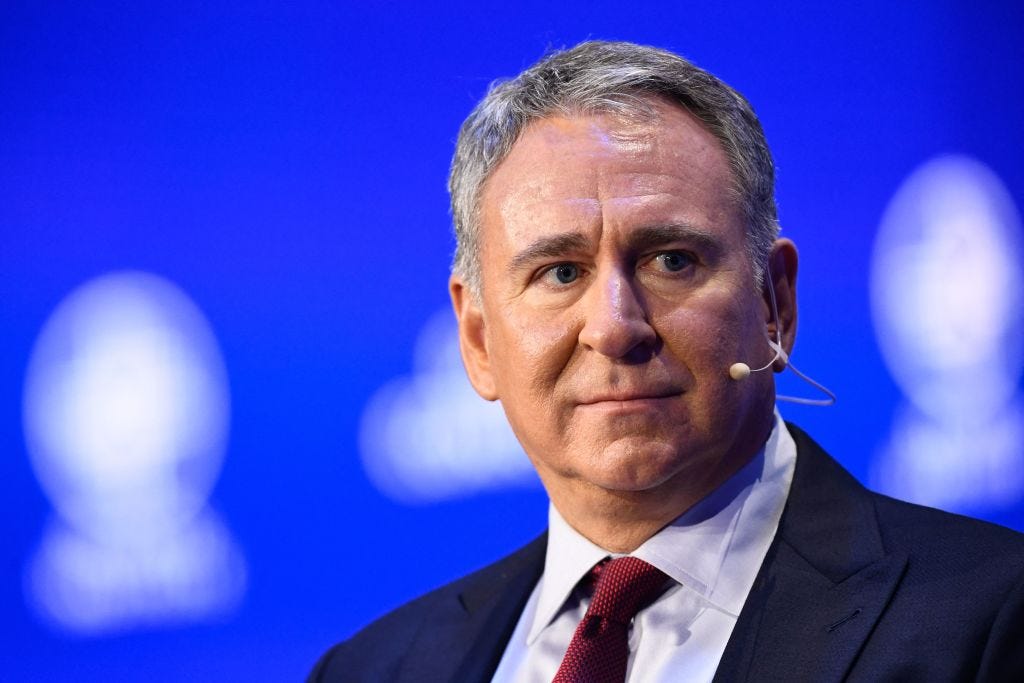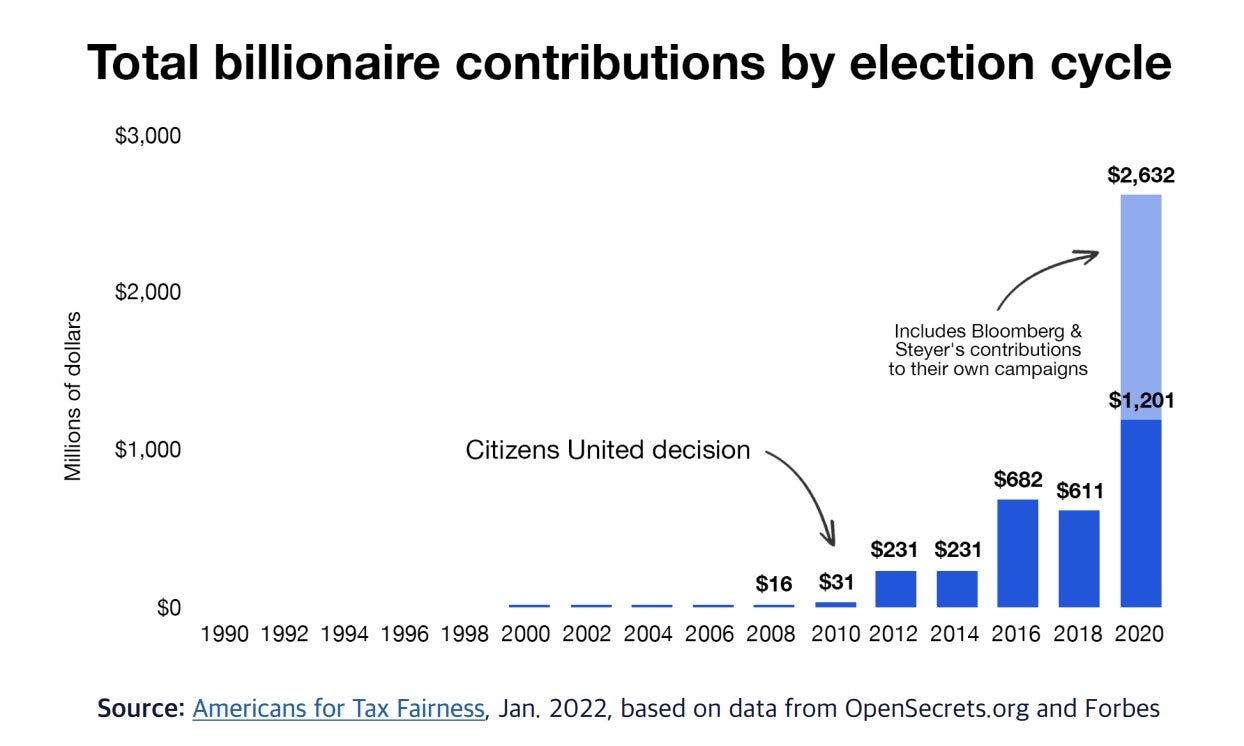The billionaires buying the midterm elections

Are the 2022 midterm elections for sale? A handful of billionaires are trying to find out.
Two primary super PACs seek to establish Republican majorities in the Senate and House — the Senate Leadership Fund (SLF) and the Congressional Leadership Fund (CLF). Those two groups, which can accept unlimited donations, collectively raised $188.3 million through March 2022. Nearly half of the money, $89.4 million, has come from just 27 billionaires, according to a new report from Americans for Tax Fairness.
This figure understates the influence of billionaires pushing to restore Republican majorities in Congress. An additional $40 million in funding to the SLF and CLF has come directly from corporations. Some of these corporations are controlled by billionaires. Koch Industries, for example, has donated $1.75 million to the SLF and CLF and is controlled by billionaire Charles Koch.
Another $35 million in donations to the SLF and CLF comes from entities organized as non-profits that do not disclose their donors. $18.7 million in funding comes from the American Action Network, a non-profit run by the same group of leaders, including former Republican Senator Norm Coleman, that run the CLF. The source of these funds is entirely opaque.
The Democratic counterparts to the SLF and CLF, the House Majority PAC (HMP) and the Senate Majority PAC (SMP), raise significant funds from billionaires — but it is a smaller percentage of their total receipts. According to Americans for Tax Fairness, the HMP and SMP have collectively raised $154 million in the 2022 cycle. About $25 million, around 17%, has come from billionaires.
The reliance on billionaire dollars by Republicans and Democrats in 2022 reflects an acceleration of an alarming trend in American politics. Since the Supreme Court eliminated limits on so-called "independent" expenditures by corporations and the wealthy in Citizen's United (2010), political spending by billionaires on federal races has exploded.
During the first two years of the pandemic, the net worth of the 44 billionaires who donated this cycle to the main Democratic and Republican Super PACs increased by $168 billion. These billionaires are now using a small percentage of their extraordinary wealth to shape the federal government to meet their economic and ideological interests.
Meet Republican billionaire Ken Griffin
The largest donor to the main Republican super PACs is billionaire Ken Griffin, owner of Citadel, a hedge fund. Griffin donated $28.5 million to the SLF and CLF through the end of March. In a 2012 interview, Griffin was asked if "the ultrawealthy have an inordinate or inappropriate amount of influence on the political process."
"I think they actually have an insufficient influence," he replied.
Griffin says he wants the government to be less involved in financial markets. "I spend way too much of my time thinking about politics these days because government is way too involved in financial markets these days," Griffin said. "[T]he government being involved in picking winners and losers invariably leads to a loss of economic freedom and encourages corruption."
But Griffin was happy to have the government involved in 2008, when his hedge fund plummeted 55%, hemorrhaging $8 billion in client assets. Worse, Citadel was a securities lending counterparty with AIG, a large insurance and financial company on the verge of collapse. If AIG went under, it could have taken Citadel with it.
Instead, AIG received a $182 billion taxpayer bailout. As part of this, AIG was able to pay counterparties full value for their otherwise worthless contracts. Citadel got a $200 million cash infusion financed by taxpayers. (Ben Bernanke, the former Federal Reserve Chairman who engineered the AIG bailout, now works for Griffin at Citadel.)
Griffin spends lavishly to keep his tax rate low. In 2020, Griffin spent $54 million in a successful effort to defeat a ballot initiative that would have increased the tax rate for anyone making more than $1 million in Illinois, his home state, from 4.95% to 7.99%. (Anyone making under $100,000 would have received a tax cut.)
Griffin spent about $18 per vote to defeat the initiative. But it was a good investment. Defeating the initiative has saved Griffin about "$51 million every year in extra tax." In June, Griffin announced he was moving Citadel to Miami anyway, a state with no income tax. Griffin is one of the largest donors to Governor Ron DeSantis (R).
Returning the House or Senate to Republican control will reduce the risk of a federal billionaires tax. In March, President Biden proposed a plan to tax individuals worth $100 million or more at a 20% rate, applied to their total wealth. The proposal would "eliminate the ability for the unrealized income of ultra-high-net-worth households to go untaxed for decades or generations" and raise an estimated $361 billion over 10 years.
Griffin's spending is only rivaled by right-wing venture capitalist Peter Thiel, who has spent almost $30 million through super PACs dedicated to the Senate campaigns of two former employees, J.D. Vance (R) in Ohio and Blake Masters (R) in Arizona.
Meet Democratic billionaire Sam Bankman-Fried
Sam Bankman-Fried, who made his fortune by founding the crypto-currency exchange FTX, is the top donor to the main Democratic super PACs. Bankman-Fried, who is currently worth about $11.5 billion, donated $6.5 million to the HMP and SMP through the end of March. For Bankman-Fried, it's just the beginning. He says he's prepared to spend up to $1 billion on politics between now and 2024.
Bankman-Fried spent about $12 million supporting Carrick Flynn, an Oregon Congressional candidate with no political experience who didn't even vote in most prior elections. Bankman-Fried donated the money through his super PAC, Protect Our Future, which is purportedly focused on pandemic prevention.
Notably, the HMP also spent $1 million supporting Flynn's campaign even though Biden won the district by 14 points and it is not expected to be seriously contested by any Republican in November. The purpose of HMP is to keep Congress in Democratic hands.
Despite the extraordinary spending on his behalf, Flynn was defeated by Oregon Representative Andrea Salinas (D), who received twice as many votes. Bankman-Fried spent $912 for every vote Flynn received.
Flynn claimed he "didn’t really care" about crypto regulations and had "no idea" how he would vote on crypto legislation. And Bankman-Fried has not explicitly said that Protect Our Future favors "candidates friendly to the cryptocurrency industry."
Bankman-Fried, however, has spoken enthusiastically about an industry-friendly crypto bill introduced by Senators Kirsten Gillibrand (D-NY) and Cynthia Lummis (R-WY). Bankman-Fried has also donated $2 million "to GMI PAC, a super PAC championing candidates friendly to 'blockchain innovators.'"




How I despise the 1%.
Last year people like me, small donors and activists made a difference in the GA run-off elections. I am donating to Blue Senatorial candidates across the US, writing post cards in PA for Fetterman and going to call and text.
I have feelers out to help get the voters out for Marcus Flowers vs MTG on election day in GA.
If every one of us did similar we can win the battle. Billionaires can buy much. But I am not much and they can't buy me.
I am fighting back. #resist
How either party can try to claim it is "the party of working people" is beyond farcical at this point.